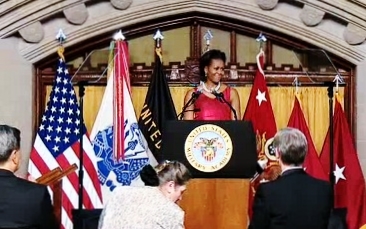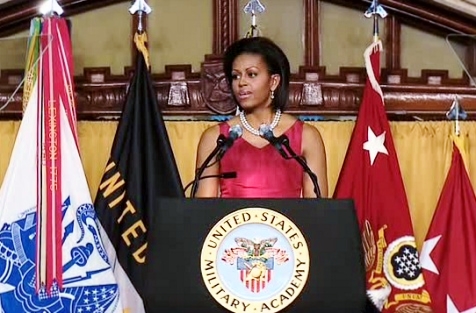[AUTHENTICITY CERTIFIED: Text version below transcribed directly from audio]
Thank you. Thank you, so much. Hello, everyone! Thank you for this wonderful welcome. I want to thank [Lt.] General Huntoon for that very, very kind introduction. I also want to thank Secretary McHugh, the Class of 1961 bar presenters, all of our distinguished guests, all of the parents, families, friends who are joining us tonight. And of course, I want to say thank you for inviting me here to the United States Military Academy.
It's breathtaking.
This is my first visit to West Point. It will not be my last. And I am truly humbled to speak to you tonight on an evening that is so special for all of you, for this Academy, for your families, for this country.
As I look around at the cadets in this room -- very, very good-looking group, by the way -- it is very clear to me that you all reflect everything we hope to see in ourselves and in our country: firmness of character and strength of heart, a strong body and a ferocious mind, a devotion to country and to family.
And I know that this weekend is the product of 47 months of extraordinary effort and endurance from R-Day to your last exam during TEE-week. For all of you, I know this has been a magnificent journey, a journey full of academic and athletic victories, a journey that has taken you across the country and around the world.
You’ve learned new skills and you've immersed yourselves in new cultures, which will serve you well on today’s battlefields. You’ve created a Bionic Foot, an Exoskeleton, and other robotics and cyber defense projects that will help troops in the field. Now, in the area of sports, your football team had its first winning season in 14 years and its first bowl victory in 25 years. Your women’s rugby team just brought home the national championship last weekend. And General Huntoon shared with me that most of the young women on that team never played rugby before coming to West Point. Amazing. And with your help, West Point earned its first victory in the Sandhurst Competition in 18 years.
But along with all of your successes, your journey has also been filled with plenty of challenges. You learned that crawling face-first through the mud and enduring a long, cold winter are not just metaphors. You’ve learned just how little sleep you need to survive and how much coffee you can stomach to stay awake. You’ve crammed facts into your brain until you thought it would burst -- and then you crammed in even more.
And that is the beauty of West Point. It’s a place where you learn that your greatest achievements will never come easily, and they will never be achieved alone. You learn that duty, honor, and country are not simply words, but guideposts. They dictate what you ought to be, what you can be, what you will be. And you learn that there are times when we must stand up to defend our way of life, when we must live out your class motto, “For Freedom We Fight.”
We live in such times today. And you knew this from the moment you signed up. You knew that coming to this Academy meant that you would likely be placed in dangerous situations on unknown soil. Yet you came anyway.
You have seen cadets from the classes ahead of you pack their bags for Afghanistan or Iraq; many of you have already served there yourselves. You hear updates not only from headlines and newsfeeds, but from emails and cell phone calls from friends. And yes, you’ve visited wounded friends; you’ve heard the bugle’s call each time a graduate of this academy has fallen in our wars. Yet you stayed anyway.
Each of you has taken a journey here that is uniquely your own, but follows in the great tradition of West Point. And tonight, you're on the cusp of taking a rightful place in that long, gray line.
Now this journey is a testament not just to you as individuals but also to the families that surround you, because your journey began long before you got that first military haircut and put on white-over-grey. Without your families, you never would have had the strength to tackle Beast Barracks while your peers back home were enjoying a final, carefree summer before college. Your families were the ones you called for a shoulder to lean on or a kick in the pants. They’ve been there for you for every moment of triumph and every moment of challenge. Their unending love and support provide the very foundation that allows you to stand strong today.
And that’s what I really want to talk with you about tonight. I want to talk about what family can and will mean for you as leaders of our Army and of our nation.
Now, I -- I grew up probably like many of you did. My family lived on the South Side of Chicago on the top floor of a two-family home. We didn’t have much money, but we had more than enough of what mattered. We had the unwavering love and support of family. We had a community that looked after us. We had parents who showed us by example that if we worked hard enough, if we kept ourselves grounded and held fast to certain core values, then we could be anything that we dreamed of.
My dad was diagnosed with MS when he was in his early 30s. He was an athlete. As he grew older, he grew weaker and sicker. But I remember how he still got up and went to work every day. I remember how he would drag himself out to play in the park with me and my brother. And he was a role model to our entire community. Just by being himself, he showed me what it means to be a parent, a citizen, and a leader.
And I know that each of you has your own family stories that shape you. Cadet Russ Burgin was inspired by his father, too. He saw how his dad went through chemo and radiation treatments, but never complained, never felt sorry for himself, and continued to work full-time to provide for his family. And today, fortunately, his dad is cancer free, and Cadet Burgin is here at West Point, the best place he could imagine to live out the values that his father demonstrated every day.
And then we have Cadet Woo Do, who is a first-generation American. Growing up, he’d accompany his grandfather on doctor visits as a translator, and that’s how he developed his passion for medicine -- a passion that will take him to Harvard Medical School next year (yeah).
And so many of you come from military backgrounds, like Cadets Christina Veney and Megan Snook, who each have multiple family members that graduated from this Academy. Cadet Erin Anthony can trace her family’s military history to the 1600s.
But Cadets, no matter how you’ve grown up, no matter how you define family, all of you have someone in your life who believed in you and pushed you. You had someone who taught you the values and lessons that will sustain you when times get tough or you’re unsure of what’s ahead. And some of those people are here with you tonight.
 So to the parents: I can
only imagine the joy you’ll feel tomorrow when you see your sons and
daughters in their officer’s uniforms for the first time. I can only
imagine the pride that comes from knowing that your kids are the kind of
kids that everyone dreams of raising.
So to the parents: I can
only imagine the joy you’ll feel tomorrow when you see your sons and
daughters in their officer’s uniforms for the first time. I can only
imagine the pride that comes from knowing that your kids are the kind of
kids that everyone dreams of raising.
But as parents, I can also imagine what else might be on your mind tonight. You all read the papers. You all understand what your children have signed up for. You know what their next assignment is. And in the back of your mind, you’re probably wondering where the assignments after will take them.
And those concerns are natural. But it is a testament to your strength, your patriotism, and your unconditional love that you have proudly supported these cadets every step of the way. And cadets, I want you all to know that these people will always be there for you. As I’ve seen in my own life and heard from troops all across this world, your family will be your rock, whether you're right next to them or across an ocean.
And soon, many of you will be building families of your own -- very soon, for some of you. I hear that, in addition to all the graduation preparations, many of you are planning weddings as well, and some honeymoons. So congratulations to all of you as you prepare for the big day. And no matter where your career takes you, know that your families will be there right alongside you -- because our force is a force of families. And that’s become more clear even in just a generation.
During Vietnam, most of our troops were young, single men. And most of those who were married had spouses who stayed at home. But today, more than half of our servicemembers are married; forty percent have two or more kids; and most military spouses are employed outside of the home.
That’s what today’s military families look like. They are military spouses who pursue a career, raise their kids alone, and still find time for night school. They are children who move from town to town, constantly adjusting to new schools and making new friends. They’re Blue Star moms who wake up every morning and pray and pray that their child comes home safely. They are Gold Star families who honor the memory of their loved ones while still channeling their strength into serving others.
And graduates, this is why your role is so important. Soon you’ll be serving not just for yourselves, not just for your own families, but for all of these families. You’ll be helping your troops deal with the joy of a new birth and the disappointment of not being in the delivery room. You’ll be helping a soldier cope with a family emergency halfway around the world. And you’ll see again and again that those family relationships are just as important to a soldier’s success as anything that you can provide them in the field. And just as our troops need your leadership and support, their families do too, because they sacrifice and serve this nation right alongside anyone who wears our uniform.
But America doesn’t always see that. I mean they can thank our troops in airports and grocery stores. Because they’re wearing fatigues, we can see them. But military families don’t wear any kind of uniform, and they just blend in.
And because only one percent of our country serves in the Armed Forces, a lot of Americans simply don’t know many, if any, military families. So they're not familiar with the resilience it takes to get through a long deployment. They have no idea the courage it takes simply to turn on the evening news. They don’t fully realize the strength you need to move your family for the fourth or fifth or sixth time in a decade.
But, even though people may not always know exactly what you’re going through or exactly how to help, I can assure you that they do want to help. Admiral Mullen, who will be speaking to you tomorrow, he calls it the "Sea of Goodwill."
And believe me, I have seen that Sea with my own eyes across the country. That's why I’m working with Dr. Jill Biden to channel that Sea of Goodwill through an effort we're calling "Joining Forces" -- nationwide campaign calling on all Americans to recognize, honor, and support our military families -- not just with words, but with deeds. We want your families to feel these efforts on the ground, in your daily lives.
So we’re working across all sectors, asking everyone from government and business to faith communities and school districts to make commitments to you and your family. Already, people across this country -- including many of our largest corporations and not-for-profits have stepped up with real, tangible commitments. And let me tell you, when I meet a Member of Congress or a powerful CEO and ask for their help, I have been blown away by their enthusiasm. They all want to help. They’re all excited to do it. And we haven’t heard one single person tell us no.
So graduates, I want you to know that while this country is asking so much of you once you pin on those gold bars, we are not asking you to do it alone. You have your families that are with you today and every day. You have the many friends and family members outside these walls, the ones watching all around the Academy, and all of those who support you in your hometowns and across the country. And you have millions of folks who you don’t even know, and who you will never meet, who have your back -- from my husband right on down through the ranks of this military, from those powerful CEOs to all the teachers, the clergy, the neighbors that you deal with every single day.
We all want to give something back to you and your families because we're inspired by you. We’re inspired by the character reflected in your acceptance to this Academy, and by the courage to serve during a time of war. We’re inspired by how, over these past 47 months, you have become not simply warriors, not simply scholars. You have all become leaders. You have come to embody duty, honor, country, just like all those who came before you: Thayer, Grant, Eisenhower, Schwarzkopf. Those values stretch through generations and across this nation, powering astronauts and engineers, senators and statesmen, business leaders and five-star generals.
But tonight, I’d actually like to end with the story of someone who lived long before your motto was adopted, someone who was never a West Point Cadet, but I think that’s okay, since this building is named after him.
In the summer of 1775, we were barely two months removed from Paul Re[vere’s] ride and the shot heard round the world. And the Second Continental Congress was meeting in Philadelphia to take control of the war effort. They decided to put the Continental Army under George Washington’s command, and he was to leave for Boston immediately. And the night before he was officially commissioned as Commander-in-Chief, before he left to lead thousands of men, before he began to chart the course of freedom for our country and our world, Washington sat down to draft a letter to his wife, Martha.
In it, he writes not of battle plans or great pride and personal achievement. He writes with, in his words, "inexpressible concern" because he’s thinking about his wife. He’s thinking about her being at home, alone, on their farm. So he asks her to be strong, and he says he hopes that the time will pass as easily as possible, because, as he writes, “Nothing will give me so much sincere satisfaction as to hear this, and to hear it from your own Pen.”
Well today’s soldiers may write emails rather than penning letters. They may be able to video chat with their kids at bedtime. But that abiding love, that passionate devotion to family -- that is what has sustained so many on battlefields here in America and around the world since the beginning of this nation.
Your families -- the ones here tonight and the ones you will build someday -- will always be at the forefront of your hearts and minds. And the only thing that will give you and your troops that sincere satisfaction that General Washington spoke of is knowing that they are safe.
So alongside everything else you have learned and experienced here at the United States Military Academy, the calculus and the Shakespeare, the intramurals and leadership training, I ask you to remember that family has always been a centerpiece of our American history, our story. I want you to remember that this country and all of its citizens stand ready to serve you and your families. And I want you to remember that as long as we all do our duty, as long as we all serve with honor, then the fate of this country will never be in doubt.
So again congratulations to all of you. We are so very proud of you.
May God bless you and your families on the journey ahead.
And may God bless the United States of America.
Thank you.

 Book/CDs by Michael E. Eidenmuller, Published by
McGraw-Hill (2008)
Book/CDs by Michael E. Eidenmuller, Published by
McGraw-Hill (2008)
Audio, Images (Screenshots) Source:
WhiteHouse.gov
Audio Note: AR-XE = American Rhetoric Extreme Enhancement
Page Updated: 1/4/21
U.S. Copyright Status: Text, Audio, Image = Public domain.

